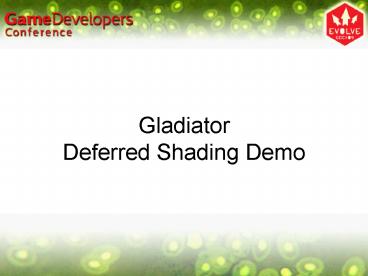Gladiator Deferred Shading Demo PowerPoint PPT Presentation
1 / 14
Title: Gladiator Deferred Shading Demo
1
Gladiator Deferred Shading Demo
2
Raw Stats
- 150k tris/frame at 30Hz
- 25 skinned characters (64 bones each), 5k-15k
tris each, tangent space bump mapped - Single scene pass deferred shading, four material
channels albedo, detail albedo, gloss, normal - Up to 24 real-time omnidirectional lights
- Unified per-pixel lighting model two-hemisphere
area, directional, and omnidirectional (point)
lights - Fully dynamic shadow volumes, CPU silhouette
extraction from low poly (400-1000 tri) meshes - Near-linear light accumulation (gamma 1.3), 2x
overbright lighting, hardware gamma ramp converts
from gamma 1.3 to sRGB (http//www.srgb.com)
3
Deferred Shading Observations
- A significant fraction of the total scene time
can be spent just rendering attributes. - Reducing the number of scene passes frees up lots
of CPU/GPU time for other stuff shadows, lights,
etc. - Why not the holy grail ONE scene pass?
- For a single pass scheme to work on Xbox, all
attributes must be all packed into a single
32-bit ARGB color. Were dont have the luxury of
MRTs (Multiple Render Targets).
4
Deferred Shading Observations
- What are the minimum attributes needed for decent
per-pixel lighting with bump mapping? - Depth, Albedo, Normal, Gloss
- For a workable solution the attributes must be
packed after texture filtering. Without this
requirement the problem is much easier point
sample prepacked textures. - At first glance this doesnt seem possible How
to pack all attributes needed for decent
per-pixel lighting into one 32-bit ARGB color
using the Xboxs texaddrops (Texture Address
Operations) and combiners?
5
Identifying Limitations and Whats Really
Important
- In order to pack all attributes so tightly its
necessary to identify the perceptual importance
of each attribute. - The pack/unpack process described here was
heavily influenced by the Xboxs GPU
architecture, NTSC (Never the Same Color) display
output, and the genre of our demo.
6
Looking at the Problem Backwards
- Unpacking
- Assume the packing problem has been solved How
to quickly unpack the attribute data during the
screenspace lighting passes into a form suitable
for lighting in the combiners? - Xbox supports 2D dependent texture lookups using
AR or GB as the source texture coordinates. So it
seems natural to pack albedo/gloss into one pair
of components (AR) and the normal into the other
set (GB). - Unpacking in the light shaders will be easy, and
not require any combiners. - Requires two precomputed lookup tables (256x256
2D texture maps).
7
Know Your Attributes
- Albedo Packing
- Good albedo textures shouldnt have much if any
burned-in lighting - With per-pixel lighting their influence on the
final look doesnt justify a full 24-bit color in
many cases 16-bits or even less can look OK - Detail Texturing
- Shrek Xbox made heavy use of 2-3 layer detail
albedo texturing (modulation and compositing), so
it seems prudent to require some type of detail
map support. - The packing process must occur after the texture
lookups, ruling out texaddrop (lookup table)
assisted packing.
8
Know Your Attributes
- Gloss Packing
- Some type of per-pixel or per-material gloss
(specular intensity) control is necessary. - The grayscale gloss maps used in Shrek where
usually plain, so scrunching gloss down to a few
bits (2-4) shouldnt be a show stopper. - Normal Packing
- Output is constrained to a unit length vector.
Its possible to discard the magnitude of one
component and recover it later - z zSign sqrt(1 x x y y)
- Sign of discarded component can be stored as a
single bit. - Z Recovery op can be done in the 2D dependent
lookup used for normal unpacking.
9
Attribute Packing Pixel Shader
- Samples albedo and tangent space normal maps
- Cubemap renormalizes iterated geometric normal
- Cant renorm. the iterated tangent and binormals.
They arent as perceptually important anyway. - Rotates normal from tangent to view space in the
combiners - Approximately renormalizes rotated normal
- Equation n n .5 (1 - dot(n, n))
- Packs normal into Output.GB
- Packs albedo and gloss into Output.AR
- Note Shader detailed here only supports 1
albedo map. Detail texturing is an exercise for
the reader.
10
Attribute Packing Pixel Shader Final Bit Layout
-1 of 2
- Output AR BRGL 4462
- Output GB ZYX 178
- Albedo can be encoded as sRGB or YCbCr
- 4 bits for Albedo.B/Cb and Albedo.R/Cr
- 6 bits for Albedo.G/Y
- 2 bits for Gloss (L)
- Normals are packed in view space
- 1 bit for Normal.Z (sign)
- 7 bits for Normal.Y
- 8 bits for Normal.X
11
Attribute Packing Pixel Shader Final Bit Layout
2 of 2
- Output Color AAAA AAAA RRRR RRRR GGGG
GGGG BBBB BBBB - Packed Bits BBBB RRRR GGGG GGLL ZYYY
YYYY XXXX XXXX
Key to Packed Bits B Blue/Cb (4 bits) R
Red/Cr (4 bits) G Green/Y (6 bits) L Gloss (2
bits) X Normal.X (8 bits) Y Normal.Y(7
bits) Z Normal.Z sign (1 bit)
12
Load Time Texture Map MungingSimplifies
Packing Pixel Shader
- The color components of the albedo/normal
texture palettes are rearranged, or duplicated to
the alpha channel. - Albedo Texture Components
- albedoTexture.A Blue or Cb
- albedoTexture.R Green or Y
- albedoTexture.G Gloss (specular intensity)
- albedoTexture.B Red or Cr
- Normal Texture Components
- Alpha channel of tangent space normal maps
contains Y - normalTexture.A Y
- normalTexture.R X
- normalTexture.G Y (ignored by packing shader)
- normalTexture.B Z
13
Packing Pixel Shader Inputs Are Swizzled
Simplifies Packing Pixel Shader
- T1, V0, and V1 are the rows of a 3x3 tangent
space to view space rotation matrix - The components of each row are inverted in the
vertex shader to simplify packing - T1 View Space Normal.zyx
- V0 View Space Tangent.zyx
- V1 View Space Binormal.zyx
14
Shader Flowchart
- John Brooks (CEO, Blue Shift, Inc.) made me
delete it!

